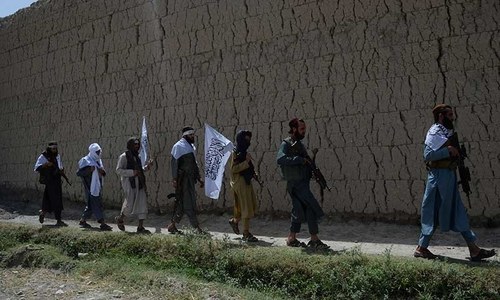WASHINGTON: The Afghan government has lost control over a record number of districts this year, although Taliban too have lost some areas, says an official US report sent to Congress this week.
The report — that covers the period between July 1 and Sept 30, 2018, — identifies a dangerous trend which could have disastrous consequences for Afghanistan and its neighbours, particularly Pakistan: a gradual increase in ungoverned areas.
It is these ungoverned areas that militant groups like TTP and militant Islamic group (IS) use for conducting raids into Pakistan as well as in major Afghan cities.
Report identifies a dangerous trend of increase in ungoverned areas having disastrous consequences for Afghanistan and Pakistan
The Special Inspector General for Afghanistan Reconstruction (SIGAR), which prepares these quarterly reports for the US Congress, notes that Afghanistan’s thinly stretched security forces have been unable to retain their control over vast areas inside the country. The official Afghan forces have also sustained record casualties during this period, the report adds.
“Unclassified data shows the Afghan National Defence Security Forces (ANDSF) made minimal or no progress in pressuring the Taliban over the quarter,” says the report, quoting the data provided by the Pentagon.
The data shows that “the ANDSF failed to gain greater control or influence over districts, population and territory this quarter. While the districts, territory, and population under insurgent control or influence also decreased slightly, the districts, territory, and population contested … increased”.
The report describes the “uncontested” areas as under neither Afghan government nor insurgent control or influence.
The report points out that Afghan government control or influence of its districts reached the lowest level (55.5 per cent) since SIGAR began tracking district control in November 2015. The Afghan government controls or influences districts in which about 65 per cent of the population lives, unchanged since October 2017.
About two-thirds of Afghanistan’s population live in the areas still under Kabul’s control. The Afghan government’s goal is to expand its control or influence over areas where 80 per cent of the country’s 33 million people live by the end of 2019.
About 3.5 million people live in areas controlled or influenced by insurgents — a slight decrease since last quarter — while the number of people living in contested areas slightly increased to 8.1 million.
The report says that since late 2015, nearly a year after the Nato transition from a combat mission to one focused on training and advising Afghans, Afghan insurgent have continued to expand their gains.
Unofficial data, however, claim that the government losses are larger than the Pentagon acknowledges. The Long War Journal, published by the nonpartisan group Foundation for Defence of Democracies, reports that a little over half of Afghanistan’s people live in districts outside of government control.
Published in Dawn, November 5th, 2018




































